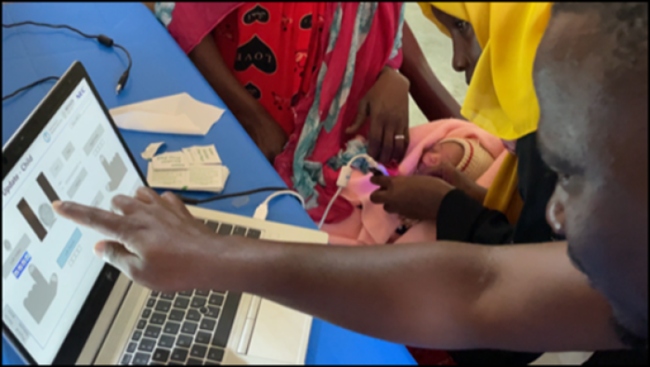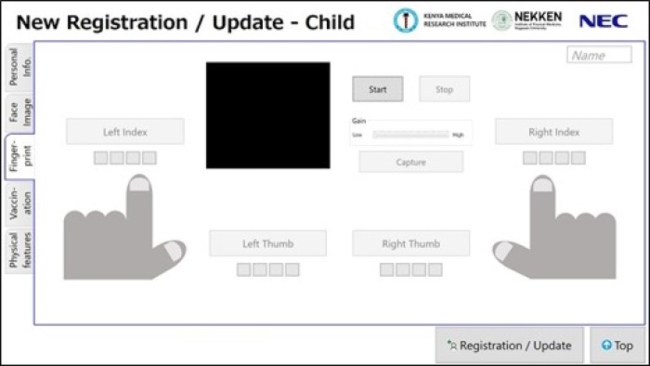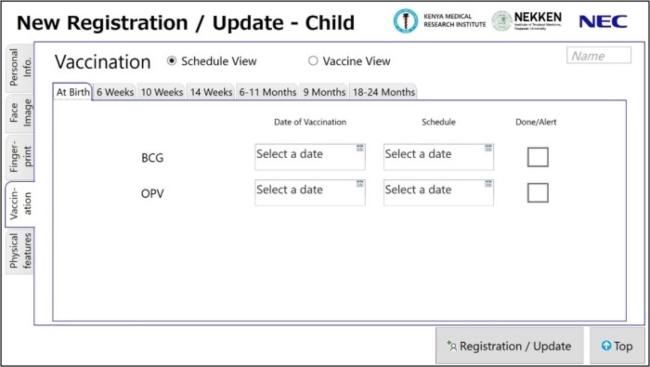
TOKYO, Feb 7, 2023 – (JCN Newswire via SEAPRWire.com) – Kenya Medical Research Institute (KEMRI), NEC Corporation (NEC) and Nagasaki University, Japan, have developed a digital biometric-based vaccination management system for newborn children in Kenya. Validation of this system is taking place through KEMRI with a clinical trial that began in September 2022 at the Kinango Sub-County Hospital in Kwale and initial results are very encouraging.
 |
|
|
 |
|
|
 |
|
|
The digital system being provided by NEC, a leader in the integration of IT and network technologies, and KEMRI, one of Africa’s leading research Institutions, will effectively and seamlessly manage vaccination history and scheduling using fingerprint identification for newborn children and voice recognition for caregivers.
This technology marks the first time that biometric identification is being used at a hospital to identify newborn children at the time of vaccination, including those immediately after delivery(1). As of November 2022, data from more than 300 caregivers and newborns had been registered, including the vaccination histories of more than 150 newborns.
The new technology combines fingerprint identification for children and voice recognition for caregivers to confirm not only their identity, but also to reliably manage vaccination histories and schedules, thereby promoting the implementation of appropriate vaccinations for newborns and children during the first 24 months of life. Going forward, demonstration tests that network among multiple hospitals will begin, aiming for full-scale introduction throughout Kenya by the end of 2023, and more international deployment in the future.
“We are excited that KEMRI together with its partners, is spearheading this landmark study that identifies newborns using a biometric and a vaccination management system that is not only in real time, but is also expected to support policy and action towards the attainment of better health outcomes and Universal Health Coverage. I am happy to announce that this tool will be validated by KEMRI researchers in partnership with Kinango Sub-County Hospital in Kwale, NEC Corporation and Nagasaki University,” said Prof. Sam Kariuki, Acting Director General, Kenya Medical Research Institute (KEMRI)
“I expect that this vaccination management system, including newborn fingerprint biometric technology, will expand the coverage of vaccinations for children under 24 months old through accurate identification methods for mothers and children in Kenya. I also express great expectations for this research to act as a guideline for precise vaccination management featuring newborn and caregiver identification to become an important contributor to Universal Health Coverage,” said Prof. Miriam Khamadi Were, Laureate, 1st Hideyo Noguchi Africa Prize
The system utilizes voice recognition to identify caregivers, as well as fingerprint patterns to ensure that newborns are appropriately matched with the identified caregivers. Since voice recognition can be performed almost instantaneously, this system can minimize the burden placed on caregivers. Medical institutions can also introduce voice recognition with little to no change to existing procedures. Rather than using conventional fingerprint authentication methods to identify newborns, researchers developed a new method with which fingerprint pattern information is extracted from fingerprint images and a newborn child can be identified by combining fingerprint pattern data from multiple fingers.
Importance of and challenges associated with vaccinations
Many children around the world continue to lose their lives at a very young age. In 2020 alone, approximately 5 million children died before reaching their fifth birthday, even without taking into account the impact of COVID-19. Furthermore, about half of these children under the age of five, or 2.4 million children, passed away within 28 days of birth, with many of these deaths considered preventable(2).
Meanwhile, in some regions in the world, the use of digital technology has not advanced due to delays in the development of electricity and telecommunications infrastructure. In these regions, basic information such as who was born, when, where, and what type of medical services they have received may only be recorded by hand. In such cases, health care providers cannot easily ascertain which medical services are needed for the caregivers and children who visit their hospitals, which is one of the factors hindering efforts to ensure that children receive the vaccinations they need.
Procedures for using this system in hospitals.
The trial at this hospital is being conducted in accordance with the following procedures.
1. Register the caregiver’s voice and the newborn’s fingerprint patterns on the day of birth (four fingers in total: left thumb, right thumb, left index finger, right index finger).
2. Hospital staff encourage caregivers to return to the hospital according to the prescribed vaccination schedule.
3. Caregivers are identified using voice recognition when they state their names at the time of their hospital visits, and their children are identified based on database information.
4. Scan fingerprints from four fingers using a special scanner. Verify the child’s identity by matching the data from the previous step with the pattern extracted from the scanned fingerprints.
5. Administer the prescribed vaccination(s) and register the vaccination history in the system.
Overview of the trial
– Implementation period: September 2022 to March 2023
– Hospital: Kinango Sub-County Hospital in Kwale
– Participants: Approximately 1,000 caregivers and newborns who elect to participate in this trial (data has been registered for approximately 300 individuals as of the end of November 2022)
– Description of trial: Using the vaccination management system, the hospital records information on the physical characteristics of newborns at the time of birth as well as the history of and schedule for administration of eight different vaccines and one vitamin supplement up to 24 months after birth to verify the effectiveness of and issues related to the system. The voice and fingerprint pattern data acquired will be used only for the current purpose of this trial and will be deleted after its completion.
Identification using fingerprint patterns
This system uses NEC technology to classify fingerprint images collected from multiple fingers of a newborn (a total of four fingers: left thumb, right thumb, left index finger, right index finger) into five categories according to the shape of each whorl(3) and then registers the fingerprint pattern data. The system also combines pattern-based classification with NEC’s voice recognition to improve accuracy when verifying the identity of caregivers and newborns.
These efforts to increase vaccination coverage support Sustainable Development Goals (SDG) 3.2, “By 2030, end preventable deaths of newborns and children under 5 years of age, with all countries aiming to reduce neonatal mortality to at least as low as 12 per 1,000 live births and under-5 mortality to at least as low as 25 per 1,000 live births.” The efforts also contribute to the realization of SDG 16.9, “By 2030, provide legal identity for all, including birth registration,” by providing all newborns with a record of parent-child relationships and birth location information, as well as a means of identification.
(1) NEC research as of February 7, 2023
(2) Source: Levels and trends in child mortality, Report 2021, UN-IGME
new windowhttps://data.unicef.org/resources/levels-and-trends-in-child-mortality/
(3) The number of categories is under verification and may be changed in the future
About NEC Corporation
NEC Corporation has established itself as a leader in the integration of IT and network technologies while promoting the brand statement of “Orchestrating a brighter world.” NEC enables businesses and communities to adapt to rapid changes taking place in both society and the market as it provides for the social values of safety, security, fairness and efficiency to promote a more sustainable world where everyone has the chance to reach their full potential. For more information, visit NEC at https://www.nec.com.
Copyright 2023 JCN Newswire. All rights reserved. (via SEAPRWire)
source https://netdace.com/jcn-newswire/kemri-and-nec-announce-trials-on-biometric-based-vaccination-management-system-for-newborn-children-in-kenya/